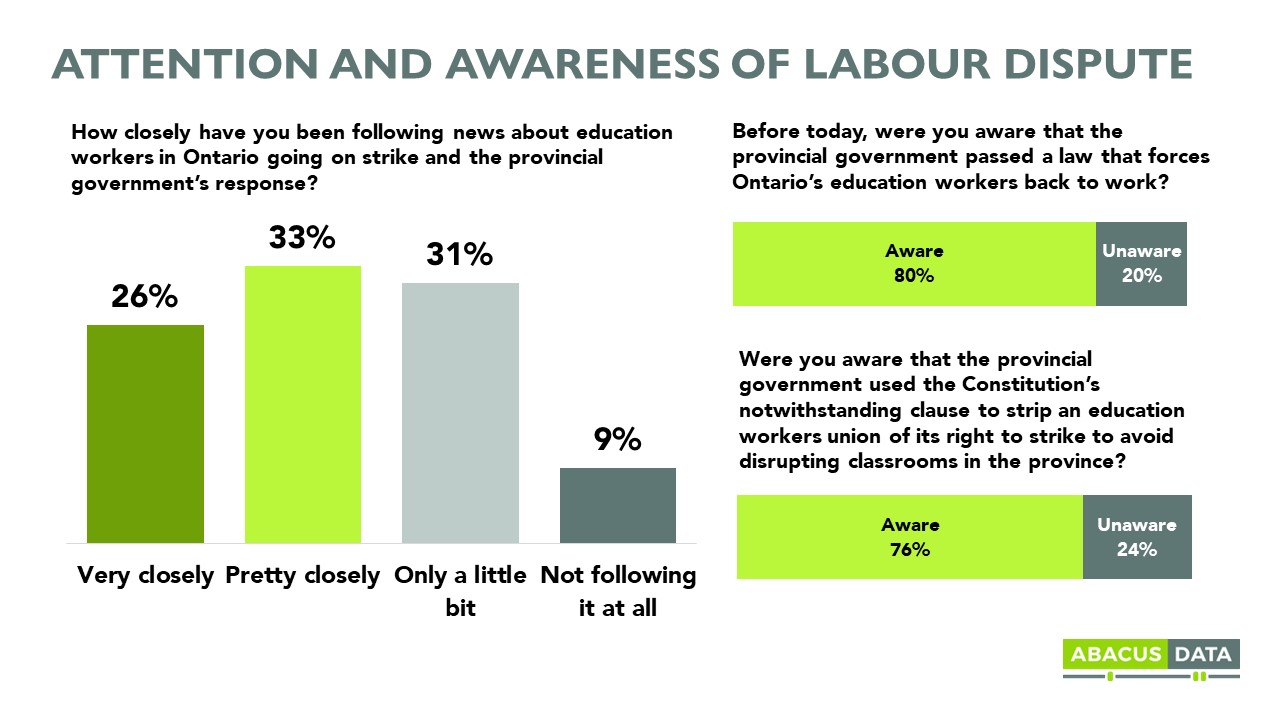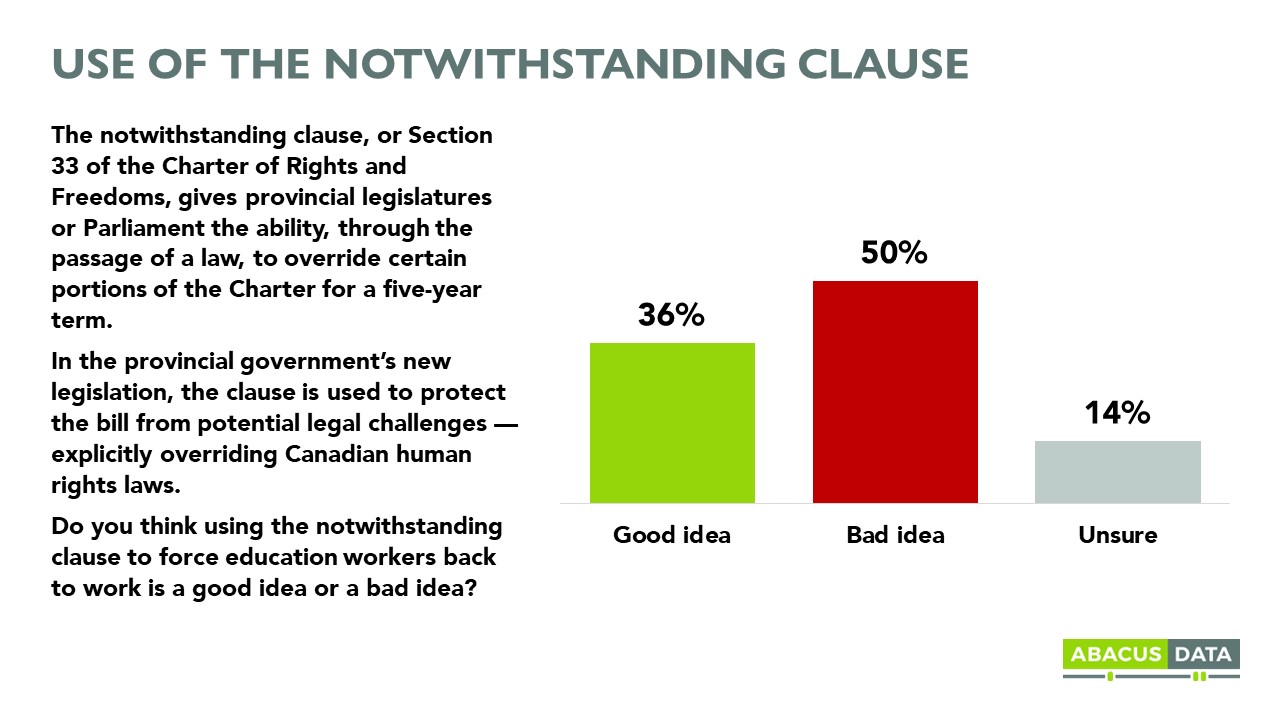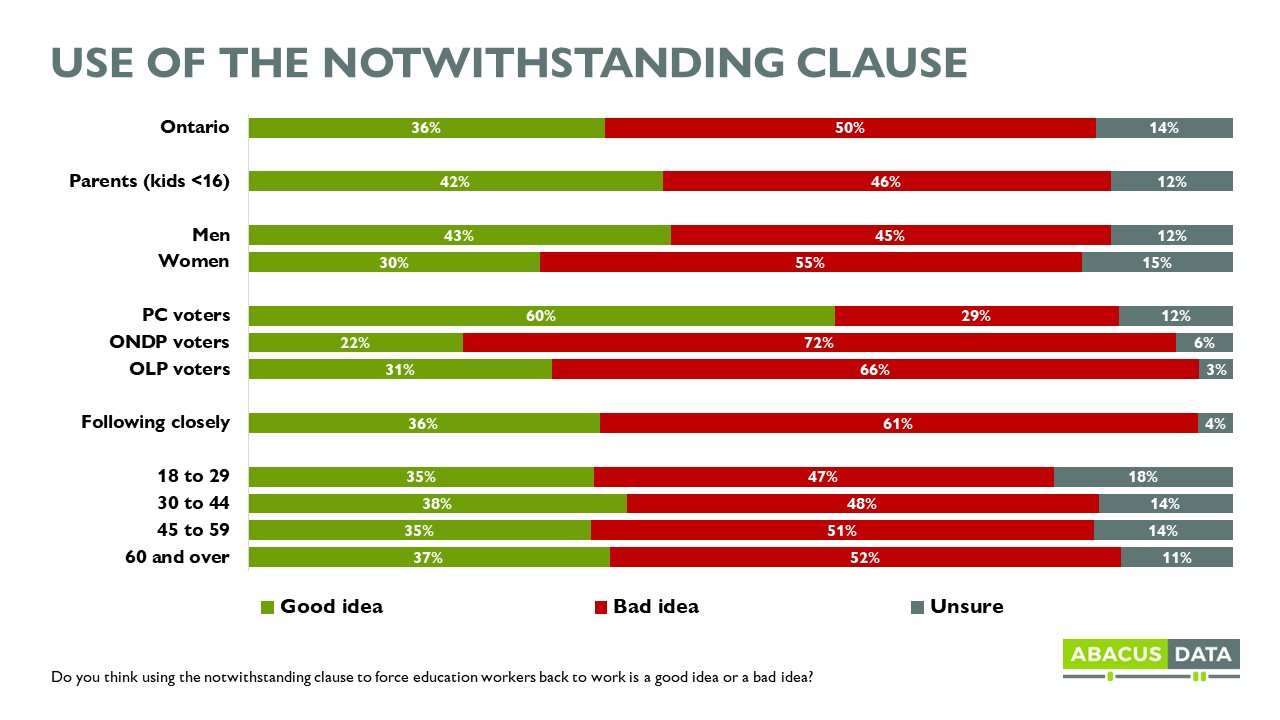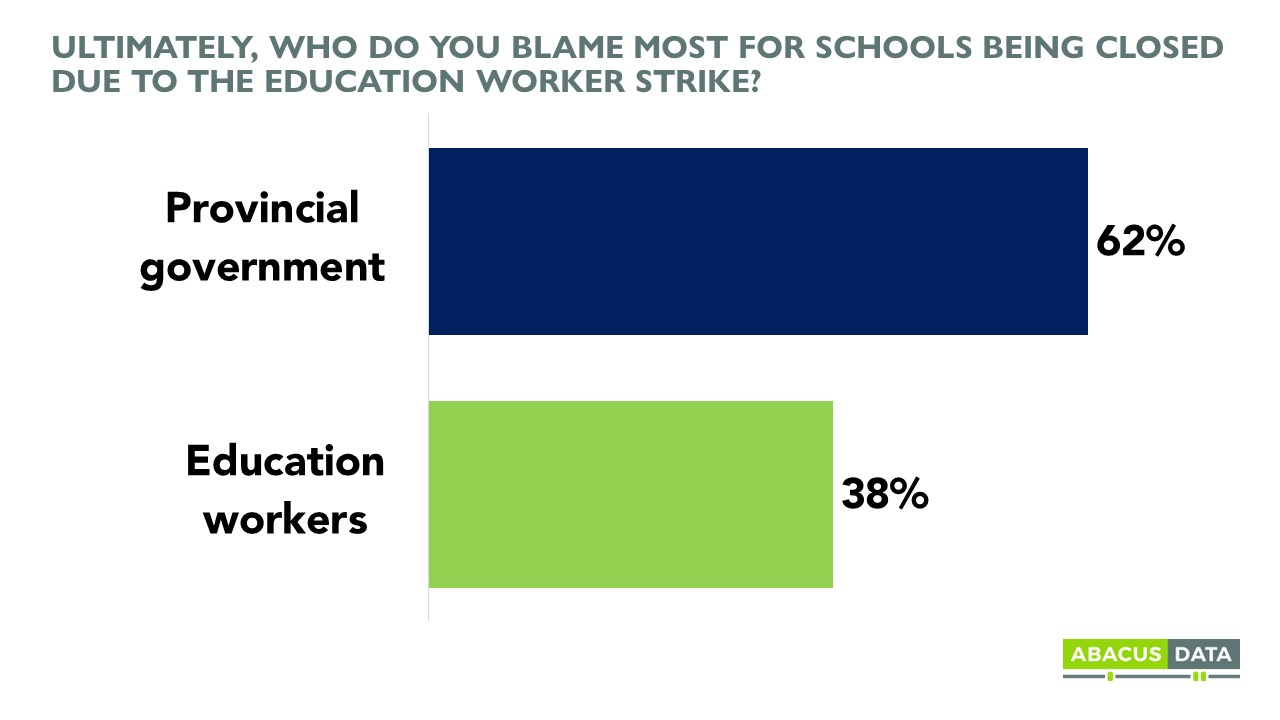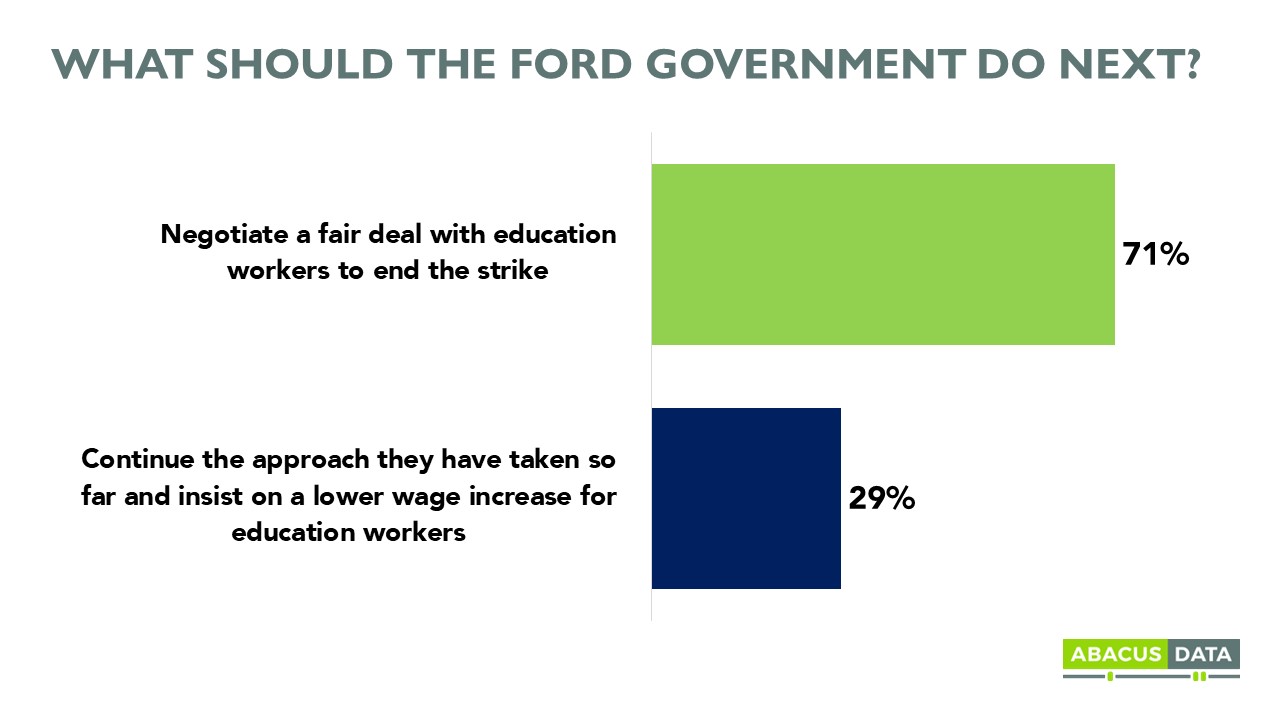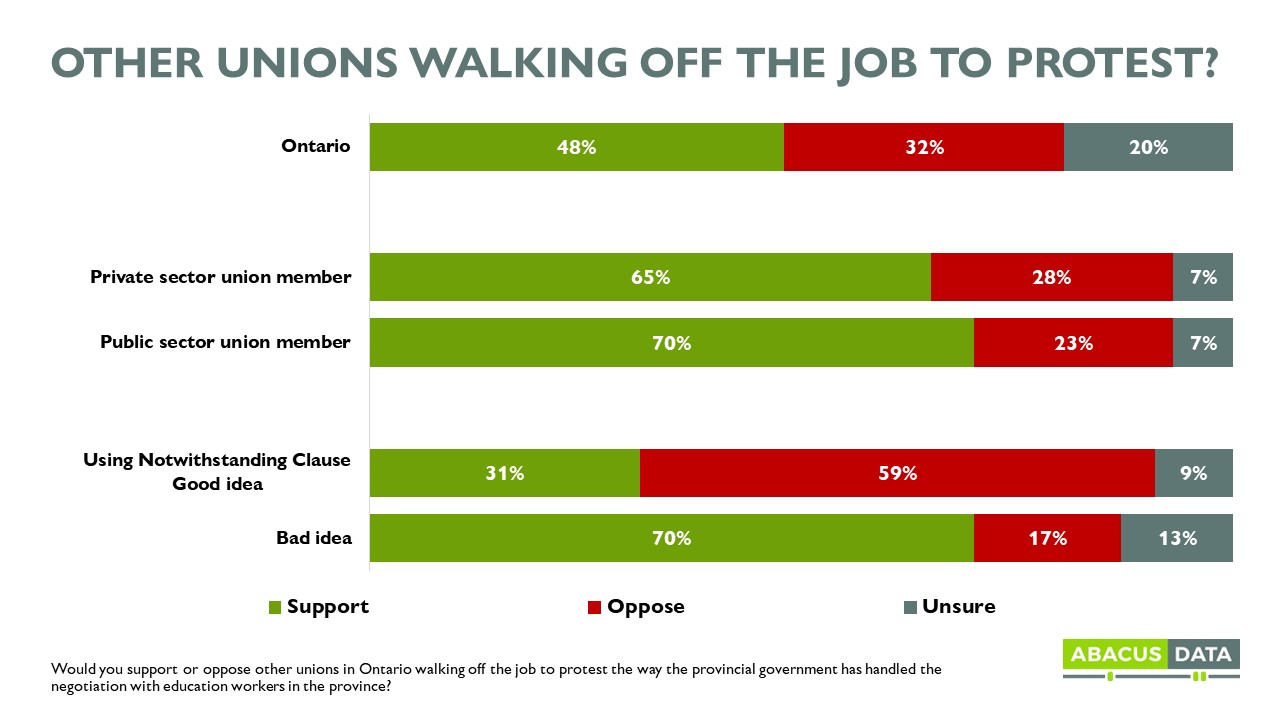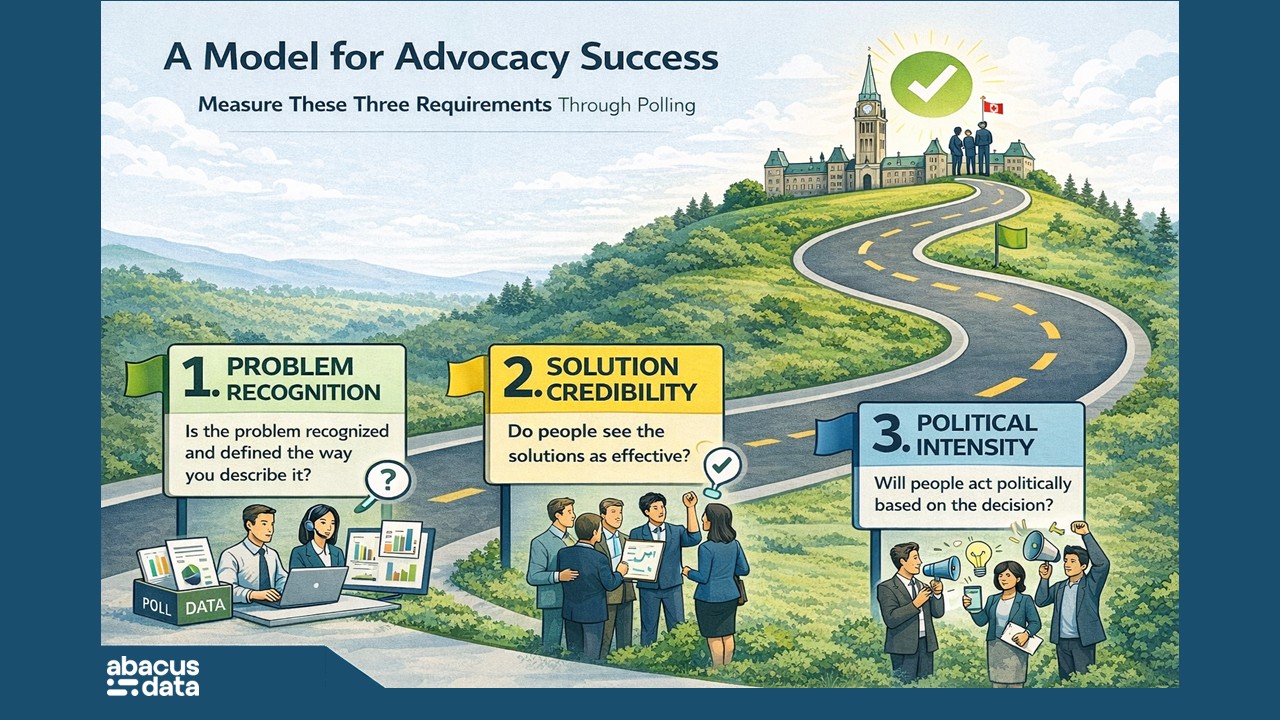Ford vs. Education Workers: How are Ontarians reacting?
November 6, 2022
On November 4th and 5th, we conducted a province-wide survey of 1,000 adults to explore initial public reaction to the labour dispute between the Ontario government and the province’s education workers who were set to strike on Friday.
The survey finds:
1. There is widespread awareness and significant attention being paid to the issue by the public.
2. More Ontarians blame the provincial government for school closures than education workers.
3. Half would support more unions walking off the job to protest with education workers.
4. 71% want the provincial government to negotiate a fair deal with education workers rather than continue with its current approach.
5. The political impact on the PCs has been limited thus far. They would win easily again if an election was held today.
Here are the detailed results:
ATTENTION AND AWARENESS OF THE LABOUR DISPUTE
Millions of Ontarians are paying attention and following news about education workers in Ontario going into a strike position and the provincial government’s response. 59% are following it very or pretty closely and over 80% are aware that the provincial government passed a law that forces workers back to work. 76% are aware that the provincial government invoked the notwithstanding clause.
Not surprisingly, parents of school-aged children are following the issue more closely. 36% are following very closely while 32% are following it pretty closely.
USE OF THE NOTWITHSTANDING CLAUSE
Half of Ontarians think it is a bad idea to use the notwithstanding clause to force education workers back to work while about 1 in 3 think it is a good idea.
Parents are more divided than Ontarians generally. 42% think it’s a good idea while 46% think it’s a bad idea. Among PC voters, 60% approve while about 3 in 10 disapprove of using the notwithstanding clause. Men are also 13-points more likely to think it’s a good idea to invoke the clause than women.
WHO IS TO BLAME FOR SCHOOLS BEING CLOSED?
More than 6 in 10 Ontarians blame the provincial government most for schools being closed while 4 in 10 blame education workers the most.
68% of parents of school-aged children blame the provincial government most, as do 70% of women, 69% of those following the issue closely, and 37% of 2022 PC voters.
WHAT SHOULD THE FORD GOVERNMENT DO NEXT?
More than 7 in 10 Ontarians want the Ford government to negotiate a fair deal with education workers to end the strike rather than continue the approach they have taken so far and insist on a lower wage increase for education workers. 29% prefer if the government continues its approach.
69% of parents and 56% of PC voters want the government to negotiate a fair deal.
One reason why Ontarians want the provincial government to negotiate a fair deal with education workers is because about half think they don’t make enough money. When asked whether non-teaching staff in schools make too much, not enough, or about the right amount, 50% say don’t make enough, 28% feel they make the right amount, while 7% say they make too much.
In fact, when we ask – “Do you think making $39,000 per year is enough or not enough given the rising cost of living across Ontario?”- 78% of Ontarians say that salary is not enough given the rising cost of living.
SHOULD OTHER UNIONS PROTEST WITH CUPE?
Almost half of Ontarians (48%) support other unions in Ontario walking off the job to protest the way the provincial government has handled the negotiation with education workers in the province. 33% are opposed while 20% are unsure.
51% of parents, 29% of PC voters, and 65% of those following the issue closely support other unions protesting with education workers.
THE POTENTIAL POLITICAL CONSEQUENCES
By a 2 to 1 margin, Ontarians say the way Doug Ford and the provincial government has dealt with negotiations makes them less likely to vote PC than more likely to vote PC. But, at this point, it doesn’t look like the issue is hurting the Ford government.
For example, while 1 in 5 past PC voters say they are less likely to vote PC, about 1 in 10 NDP and Liberal voters say they are more likely to vote PC because of it.
Parents of school-aged children are split at this point. 31% say they are more likely to vote PC while 38% say they are less likely to.
IMPRESSIONS OF PREMIER FORD & MINISTER LECCE
Since the June provincial election, Premier Ford’s personal image has become less positive and more negative. Today, 29% have a positive impression of the Premier (down 10 points) while 45% have a negative view (up 5 points).
When we asked about Education Minister Stephen Lecce, 15% have a positive view of him compared with 42% who have a negative view.
PROVINCIAL VOTE INTENTION
If an election was held at the time of the survey, the PCs would easily win another majority. 38% would vote PC, down 3 from the June election results. The Ontario Liberals and NDP are basically tied for second at 27% and 26% respectively. Both are up slightly from the results of the spring election.
The PCs have a wide lead among men, and among those over the age of 45 while being competitive among women and those aged 30 to 44. Of note, parents with children aged 15 or younger are slightly more likely to say they would vote PC than the province as a whole (40% vs. 38%). Among those parents, the PCs lead the Liberals by 13-points.
UPSHOT
This initial survey of public opinion in Ontario finds that many people are following this issue closely and are aware of the provincial government’s actions thus far. By a 2 to 1 margin, Ontarians blame the provincial government for schools being closed rather than education workers and about 7 in 10 want the provincial government to negotiate a fair deal with workers rather than continue with its current approach. We also find fairly wide support for other unions joining education workers in protesting the government’s approach to dealing with the labour dispute – especially among other unionized workers in both the private and public sectors.
Despite all of this, the Ford government hasn’t been hurt politically. While Doug Ford’s personal numbers are more negative than when the election campaign ended in June, the PCs would easily be re-elected today if an election was held at the time of the survey. Furthermore, while more say they would be less likely to vote PC than more likely to vote PC because of how the government has handled this issue, the proportion of those moving away from the PCs isn’t large enough to worry the Tories and the next election isn’t for more than 3 years from now.
But this is the starting point and views can shift over time depending on what happens next. We’ll continue to monitor public opinion and reactions.
METHODOLOGY
The survey was conducted with 1,000 Ontario residents aged 18 and over on November 4 to 5, 2022.
A random sample of panelists were invited to complete the survey from a set of partner panels based on the Lucid exchange platform. These partners are typically double opt-in survey panels, blended to manage out potential skews in the data from a single source.
The margin of error for a comparable probability-based random sample of the same size is +/- 3.1%, 19 times out of 20.
The data were weighted according to census data to ensure that the sample matched Ontario’s population according to age, gender, education, and region. Totals may not add up to 100 due to rounding.
This study was paid for by Abacus Data Inc.
ABOUT ABACUS DATA
We are the only research and strategy firm that helps organizations respond to the disruptive risks and opportunities in a world where demographics and technology are changing more quickly than ever.
We are an innovative, fast-growing public opinion and marketing research consultancy. We use the latest technology, sound science, and deep experience to generate top-flight research-based advice to our clients. We offer global research capacity with a strong focus on customer service, attention to detail, and exceptional value.
We were one of the most accurate pollsters conducting research during the 2021 Canadian election following up on our outstanding record in 2019.
Contact us with any questions.
Find out more about how we can help your organization by downloading our corporate profile and service offering.

